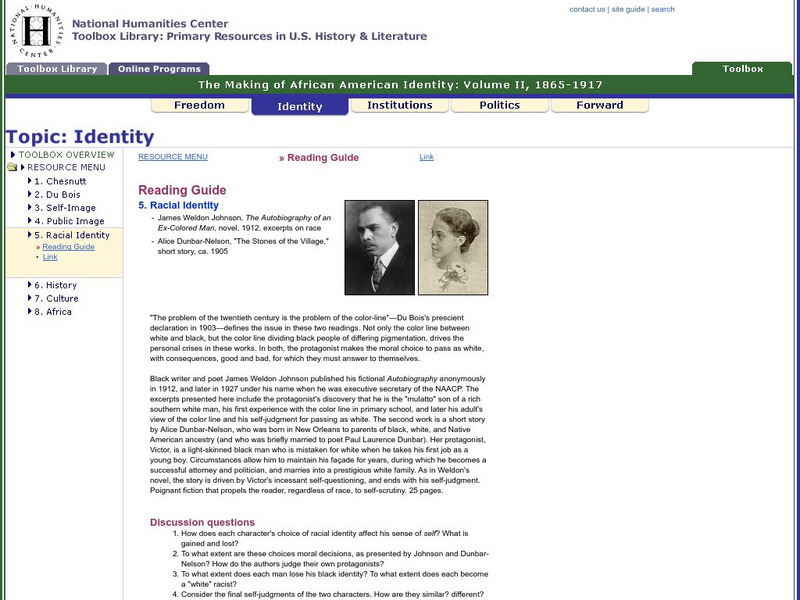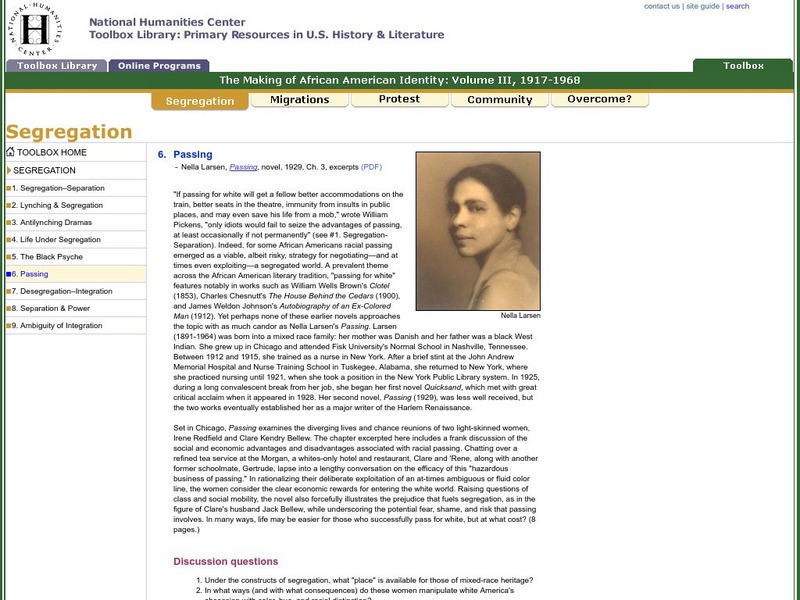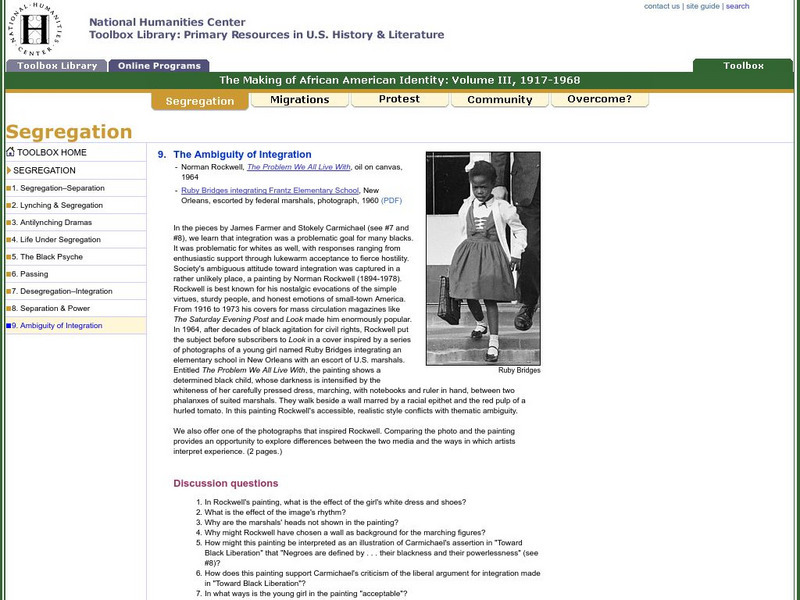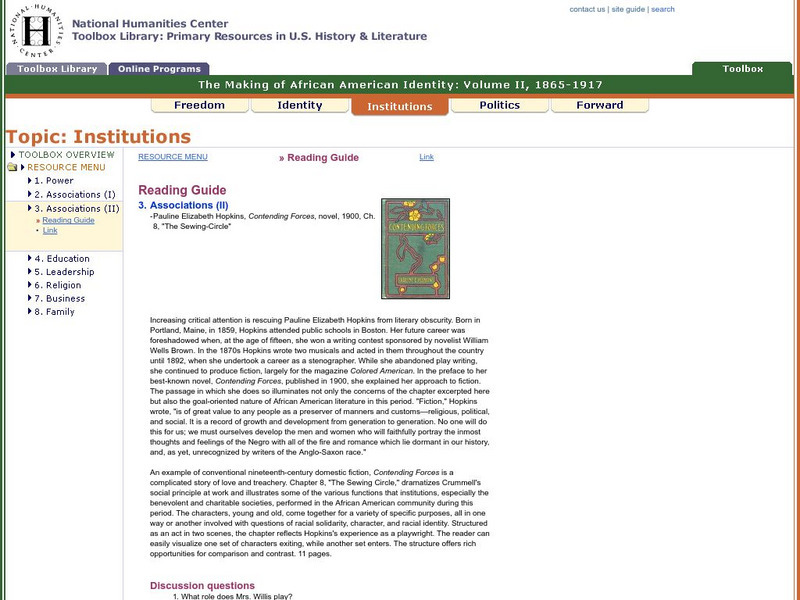National Humanities Center
National Humanities Center: Toolbox Library: Racial Identity, Making of African American Identity: Vol 2, 1865 1917
A chapter from a novel and a short story that explore the phenomenon of passing. These works examine the self-judgment and scrutiny often invoked upon oneself as a result of belonging to more than one race.
National Humanities Center
National Humanities Center: Toolbox Library: Passing: Making of African American Identity: V. 3
An excerpt from a novel that explores the tensions of racial passing. Set in Chicago, Passing examines the diverging lives and chance reunions of two light-skinned women.
National Humanities Center
National Humanities Center: Toolbox Library: History, Making of African American Identity: V. 2
An art exhibit and a chapter that illustrate African American efforts to create a usable past. Aspects of African American history, character, and potential are illustrated within this resrouce through Edward Johnson's promotion of...
PBS
Pbs Learning Media: Wide Angle: Complications of Identity
Wide Angle video tells the story of two identical twins, one of whom was classified as white and the other as black, highlighting the difficulty in defining race in Brazilian society. [2:53]
National Humanities Center
National Humanities Center: Toolbox Library: Racial Politics, Making of African American Identity: V. 2
Chapter from a novel and images that illustrate black political action in late-nineteenth-century America. Frances Harper's 1892 novel Iola Leroy, is examined, covering topics of white supremacy and racial justice.
National Humanities Center
National Humanities Center: Toolbox Library: Segregation Separation: Making of African American Identity: V. 3
This resource summarizes and links to primary source articles examining the relationship between segregation and racial separation highlighting some of the effects of segregation on the black community post World War I.
University of Hawai'i
University of Hawaii: Modernity of Ethnic Identity & Conflict
A paper discussing the apparent contradiction of racial pluralism in the world today and numerous conflicts that exist simultaneously. The paper discusses modern ethnicity, cultural pluralism, and violence among groups.
Annenberg Foundation
Annenberg Learner: American Passages: The Search for Identity: Toni Morrison
Toni Morrison is featured for her ability to illustrate the idiocies of racial stereotyping through her award winning literature. See "Toni Morrison Activities" for related materials.
National Humanities Center
National Humanities Center: Toolbox Library: Associations (I), Making of African American Identity: V. 2
Newspaper articles that illustrate how benevolent and charitable societies fostered racial solidarity among African Americans in late-nineteenth-century America are provided. Links to these articles can be found on the second page.
National Humanities Center
National Humanities Center: Toolbox Library: Ambiguity of Integration: Making of African American Identity
A painting and a photograph illustrating some of the problems posed by racial integration. Norman Rockwell's illustration is compared to the experiences of Ruby Bridges.
National Humanities Center
National Humanities Center: Toolbox Library: Separation and Power, Making of African American Identity: V. 3
An essay that examines the relationship between racial separation and power. In this essay Stokely Carmichael advocates for the coalescence of political and economic power within the black community in a way that liberates and insulates...
National Humanities Center
National Humanities Center: Toolbox Library: Attacking Stereotypes, Making of African American Identity: V. 3
Two images that express the growing militancy of the civil rights movement in the 1960s. This article explains how Joe Overstreet (1934-) and Betye Saar (1929-) went head to head with the formidable Aunt Jemima and with wit and irony...
National Humanities Center
National Humanities Center: Toolbox Library: Associations (Ii), Making of African American Identity: V. 2
Chapter from a novel that describes the workings of a charitable society. This chapter, "The Sewing Circle," illustrates some of the various functions that institutions, especially the benevolent and charitable societies, performed in...
National Humanities Center
National Humanities Center: Toolbox Library: Freedom: Charles W. Chesnutt: African American Identity
Short story that explores the cultural and linguistic resources that sustained African Americans in the first years of freedom. This resource focuses on Charles Chesnutt and the influence he achieved by writing about race for a white...
National Humanities Center
National Humanities Center: Toolbox Library: Citizenship, Making of African American Identity: V. 1
Public addresses, letters, and narratives about the absence of and the need for citizenship rights for African Americans. Links to resources used to lobby for equal rights are provided at the top of the page.
A&E Television
History.com: How the Chicano Movement Championed Mexican American Identity and Fought for Change
Chicano activists took on a name that had long been a racial slur -- and wore it with pride. In the 1960s, a radicalized Mexican-American movement began pushing for a new identification. The Chicano Movement, aka El Movimiento, advocated...
National Humanities Center
National Humanities Center: Toolbox Library: Making of African American Identity: Segregation
A Supreme Court decision, a chapter from a novel, and an editorial that explore segregation in late-nineteenth-century America. This resource focuses primarily on Plessy v. Ferguson, and the complexities that followed from this ruling.
National Humanities Center
National Humanities Center: Toolbox Library: Lynching and Segregation: Making of African American Identity
Primary source articles discusses mob violence and the practice of lynching while examining social conformity and segregation. Links to both articles, summary of text and questions for discussion.
National Humanities Center
National Humanities Center: Toolbox Library: Making of African American Identity: Segregation: Antilynching Dramas
Brief plays by Georgia Douglas Johnson that protest lynching are examined within this resource. Links to each play are provided in addition to a series of questions for discussion.
National Humanities Center
National Humanities Center: Toolbox Library: Race as Community, Making of African American Identity: V. 3
Articles illustrating how African Americans defined community according to perceptions of race. Links are provided to these works by George Schuyler, Langston Hughes, E. Franklin Frazier.
National Humanities Center
National Humanities Center: Toolbox Library: Desegregation Integration, Making of African American Identity: V.3
This resource presents James Farmer (1920-1999), a major figure in the civil rights movement of the 1950s and '60s, and the distinction he draws between integration and desegregation, two terms often used interchangeably and often confused.
National Humanities Center
National Humanities Center: Teacher Serve: The New Negro and the Black Image: From Booker T. Washington to Alain Locke
This essay explores how Booker T. Washington and others used the term "New Negro" as an attempt to recreate the race by suggesting education, refinement, money, assertiveness, and racial consciousness.
Black Past
Black Past: Baraka, Amiri
This is a very brief encyclopedia entry about Amiri Baraka, born as Everett Leroi Jones. He is an impassioned poet and playwright who wrote about the black racial identity. A link to a website for more information is provided.
PBS
Pbs Learning Media: Muhammad Ali's Activism and Moral Courage
In this lesson, students will analyze the ways Muhammad Ali protested the Vietnam War draft and racial inequity in America, and also how the American public responded. Students will examine how public perception of Ali's war resistance...




















